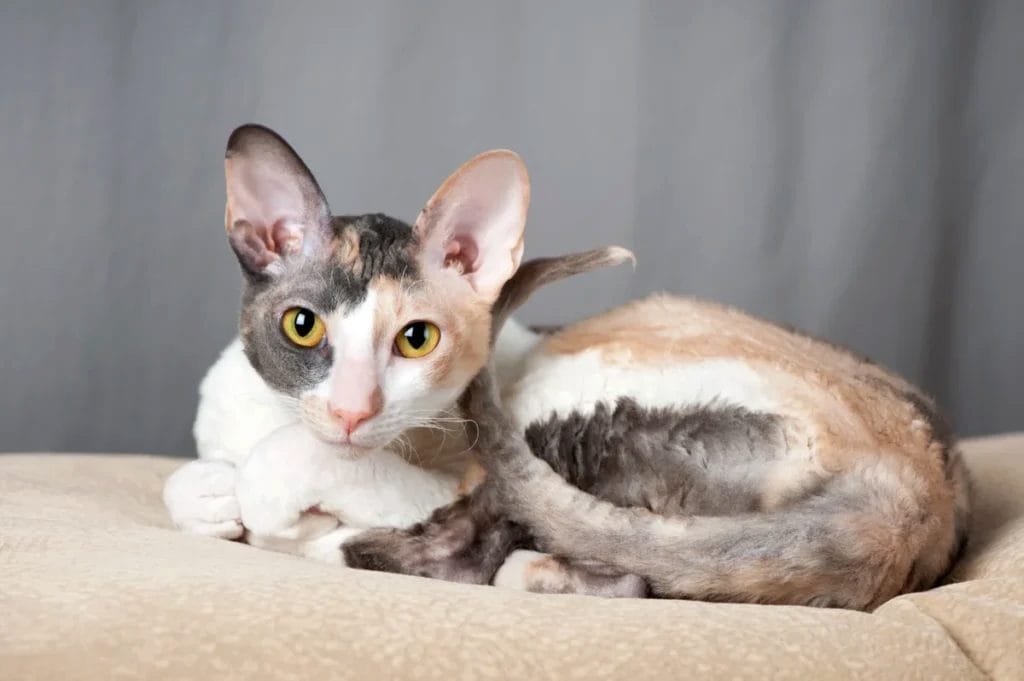The Cornish Rex originates from Cornwall, England and first appeared in the 1950s. This breed is characterized by its curly, short fur which is soft to the touch. Their coat can range from tight corkscrew curls to loose waves over their lean bodies. Has large ears, an egg-shaped head, and long legs suited for running and jumping. Their mischievous personality and dog-like loyalty make them very interactive pets. Read on to learn more about this quirky and lovable breed!
Introduction Cornish Rex Cat Breed
The Cornish Rex is a relatively modern and rare breed of domestic cat that first emerged in Cornwall, England in the 1950s. Their defining physical feature is their soft, curly coat caused by a genetic mutation. Their fur consists of tight curls or loose waves and has been described as resembling a poodle’s coat or even an astrakhan lamb’s fur.
Despite their delicate appearance, Cornish Rex cats are generally healthy and energetic. They love human interaction and are highly intelligent. Their active nature and curiosity means they demand a good amount of playtime and engagement. Thrives when raised as an indoor companion. Continue reading to learn more about their appearance, temperament, care, and origins.

Affectionate with Family: ⭐⭐⭐⭐⭐
Amount of Shedding: ⭐
General Health: ⭐⭐⭐⭐
Potential for Playfulness: ⭐⭐⭐⭐⭐
Tendency to Vocalize: ⭐⭐⭐
Kid-Friendly: ⭐⭐⭐⭐
Friendly Toward Strangers: ⭐⭐⭐⭐
Easy to Groom: ⭐⭐⭐
Intelligence: ⭐⭐⭐⭐
Pet Friendly: ⭐⭐⭐⭐
- Appearance: Slender cat with a long neck, legs, and tail. Coat consists of loose waves or tight curls and comes in many colors. Large ears and egg-shaped head.
- Characteristics: Intelligent, playful, and affectionate. Loves human interaction. Jumps and climbs well due to athletic build.
- Popularity: Fairly rare, they rank in the bottom third of cat breeds registered. More popular in Europe than North America.
- Temperament: Mischievous, energetic, and people-oriented. Devoted and loyal to families. Intelligent and easy to train.
- Lifespan: 12-15 years on average.
- Coat Colors: Come in white, black, chocolate, lavender, cinnamon, fawn, smoke, and red. Patterns include tabby, tortoiseshell, bi-color, pointed, and shaded.
- Origins: The Cornish Rex is an original breed that first emerged in Cornwall in 1950. Their coat is caused by a spontaneous genetic mutation.
How to Care for a Cornish Rex Cat Breed
The Cornish Rex may have an unconventional coat, but their care is similar to any other cat. Here are some tips for keeping happy and healthy:
Food:
- High-quality dry cat food to provide balanced nutrition. Look for plenty of animal-based protein.
- Canned wet food for extra hydration and palatability. Select grain-free options.
- Avoid cheap fillers like corn, soy, and wheat. Stick to meat-rich diets.
Environment:
- Lots of space to run and play. Cat trees, tunnels, scratching posts. Engage their natural athleticism.
- Proper cat grooming tools to maintain their coat. A slicker brush works best.
- Minimal washing is needed for their coat. Just occasional baths as required.
Grooming:
- Brush fur weekly with a stainless steel comb to remove loose hair.
- Trim claws every 2-3 weeks to prevent issues.
- Check ears and teeth regularly. Clean as needed.

Enrichment:
Engage their intelligence with puzzle toys, clicker training, and teaching tricks. Catify your home to pique their curiosity.
How to buy/adopt a Cornish Rex cat
The Cornish Rex is a fairly rare breed, so finding one may involve some searching. Here’s some guidance on selecting and adding one of these cats to your family:
- Locations: More popular in Europe, especially its native England. Limited breeders in North America.
- Price: $600-$1000 USD. Show quality cats can cost $1500+
- Rescue Groups: Check PetFinder.com. Rescues like the Cornish Rex Cat Club of America.
What to Look For:
- General health: Active, alert, bright eyes, healthy coat.
- Vaccinations: Fully vaccinated for their age.
- Medical history: Reputable breeder will provide health clearances.
Preparing for Your Cornish Rex
Here are some tips to prepare your home and lifestyle for a new Cornish Rex cat:
- Cat-proof your home by storing cables, toxins, and fragile items. Provide scratching posts.
- Stock up on quality food, litter, grooming tools, toys, beds, and other essentials.
- Spend lots of interactive playtime to engage their intelligence and curiosity.
- Introduce training and harness walks at an early age to socialize them.
- Equipments: scratching posts, cat tree, interactive toys, dental care tools, harness and leash.
- Health concerns: hypertrophic cardiomyopathy, patellar luxation, Leggs-Calve-Perthes disease.
- Necessary vaccines: FVRCP, FeLV, rabies, 4-in-1 shot.

Naming Your Cornish Rex
When choosing a name for your Cornish Rex, opt for fun human-style names that reflect their playful personality. Some examples:
- Reference their Cornish heritage like Pixie, Jasper, or Cornwall.
- Human names like Charlie, Riley, Bailey, Remy, or Quinn.
- Food inspired names like Beans, Cookie, Peanut, or Olive.
Do Cornish Rex cats like going out rather than staying home?
Cats are very people-oriented and outgoing. They thrive on adventure and playtime, so will appreciate trips outside on a leash and harness.
Are Cornish Rex cats smart?
Yes, Cat is a highly intelligent breed. They are easy to train, learn tricks quickly, and need interactive play.
How many types of Cornish Rex cats are there?
There are two varieties – the shorthaired Cornish Rex with tight curls and the longhaired Cornish Rex with a fluffy coat. Both have the signature curly Rex fur.
How to stop Cornish Rex cats from biting?
Redirect biting into acceptable activities, use deterrent sprays, reward them for not biting, say “no” firmly, and provide plenty of toys and stimulation.
How to stop Cornish Rex cats from scratching?
Provide ample scratching posts around the home, keep their nails trimmed, use double-sided tape on furniture, and consider soft plastic caps for their claws.
How to socialize and raise a friendly Cornish Rex?
Start young with handling, exposure to new sights/sounds, and positive experiences with strangers. Give them affection but discourage clinginess.
How to train your Cornish Rex cat?
Cats are highly intelligent and trainable. Use positive reinforcement, clicker training, consistency, routine, and be patient. Engage their natural curiosity.
How often should a Cornish Rex see the vet?
Take your Cats for annual check-ups and vaccinations. Also follow up if you notice any concerning symptoms or illness arise.
Are Cats good family pets?
Yes, Cats tend to do very well in families. Their affectionate personality makes them devoted to all family members including kids.
Are Cornish Rex good with children?
Yes, Cats adapt very well to homes with children. Supervise young kids and teach them gentle handling. This breed enjoys an active household.
Are Cornish Rex good with other pets?
Cat generally coexist well with cat-friendly dogs. Introduce them slowly and provide separate resources. Problems are unlikely with another cat.
Can Cornish Rex cause allergies?
No, their curled coats are low-shedding and produce less of the Fel-D1 protein that triggers allergies.
Are Cornish Rex ferocious?
No, Cats have a gentle temperament and thrive on human interaction. They are playful and energetic, not aggressive. Proper handling and care prevent any ferocity.
Do Cornish Rex have hair loss problems?
Shedding is minimal thanks to the Cornish Rex’s thin curled coat. Some fur loss may occur through rubbing, so provide soft bedding. Check for parasites if shedding increases.
Are you a cat lover who wants to learn more about your furry friends? Do you want to find the best cat food, cat care tips, and resources for your cats? If so, you’ve come to the right place! Welcome to Cat Food Site, the ultimate website for cat enthusiast.
Here you will find everything you need to know about cats Breed, from their health and behavior to their breeds, cat diet and names. You will also discover the latest cat news, cat nutrition, trends, and memes from around the web.

